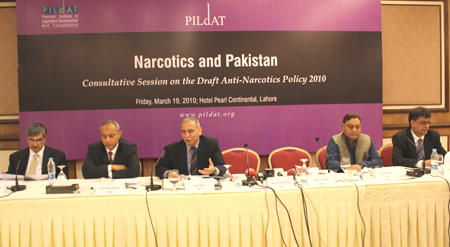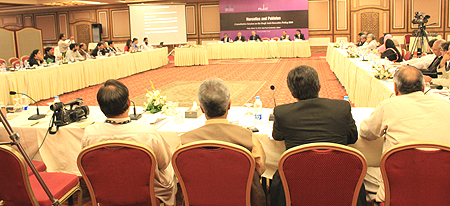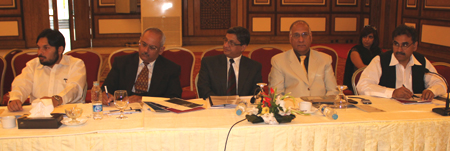|
|
| |
| EVENTS |
|
|
> Prime Minister for Lahore to be a Drug-free City: Tariq Khosa
PILDAT Consultative Session on Draft Anti Narcotics Policy 2010|: Lahore |
|
|
| |
Lahore, March 19; Prime Minister of Pakistan wants Lahore to be a Drug-free city under the new draft National Anti-Narcotics Policy 2010, said Mr. Tariq Khosa, Federal Secretary, Ministry of Narcotics Control while presenting the policy for a review at a PILDAT Consultative Session involving Punjab MPAs and other stakeholders held here today. The Ministry would soon make a presentation to the Chief Minister Punjab in this regard and assist the Punjab Government and the Lahore District Government in this regard, he said. |
|
| |
Panellists at the PILDAT Consultative Session on Narcotics and Pakistan: Consultative Session on the Draft Anti-Narcotics Policy 2010 included Mr. Tariq Khosa, Federal Secretary Ministry of Narcotics Control, Maj. Gen. Syed Shakeel Hussain, Director General, Anti Narcotics Force, Mr. Nadeem Rehman, HIV Adviser, United Nations Office on Drugs and Crime (UNODC), Country Office Pakistan and Lt. Gen. (Retd.) Moinuddin Haider, Former Governor Sindh / Former Interior Minister. A large number of MPAs from Punjab Assembly belonging to key political parties participated in the Consultative Session alongside representatives of the Punjab Government, drug control and rehabilitations organisations, medical experts, academics and youth representatives.
|
|
| |
Mr. Tariq Khosa, while outlining the need for a new policy to keep pace with changed realities of the country and the region, said that the federal ministry and agencies needed the provincial governments to lead the anti-drug and narcotics efforts in the provinces. He emphasised that the policy goal of a �drug-free Pakistan� is a dream that is only achievement through a social movement possible via wide public input and support. |
|
| |
Maj. Gen. Syed Shakeel Hussain, Director General, Anti Narcotics Force, who presented an overview of the draft policy, acknowledged that weak or non-existent coordination and control mechanisms existed in the law enforcement agencies especially on their narcotics-control functions, something that the new policy aims to correct through oversight bodies. Presenting highlights of the draft Policy, he said that the policy aimed reduction in drug supply, prevention of Drug Demand and promotion of International Cooperation in Fight against Drugs. |
|
| |
Mr. Nadeem Rehman, HIV Adviser, United Nations Office on Drugs and Crime (UNODC), Pakistan said that Pakistan is a transit and victim country and the policies must keep this aspect in view. |
|
| |
Lt. Gen. (Retd.) Moinuddin Haider, former Governor Sindh and former Interior Minister, said that he is proud to be associated with an independent, non-partisan PILDAT and its efforts to strengthen governance and democracy in Pakistan. He appreciated the effort behind the new policy and for seeking public input into it. �drug-free Pakistan may be a big dream, but we have to dream big to achieve big,� he said. He also advocated for stricter control mechanisms for an effective implementation including seizures of property of dealers. |
|
| |
Participants, while providing their input into the draft policy, said that policies must be made based on weaknesses and not on strength alone. For instance, while talking of seizure, there should also be figures available on the actual quantity that came to Pakistan in a period for a clear picture. Corruption in the law enforcement agencies at various levels of narcotics control, especially need to be taken into consideration while creating any new policy, believed participants. |
|
| |
Rehabilitation centres must be set-up and run by government, recommended MPAs. Use of drugs in the so-called elite classes, especially in schools and colleges and cafes and other hangouts has become a rather common culture and for any effective policy implementation, a crackdown on these must be envisioned. MPAs belonging to various constituencies of Punjab, especially southern and central Punjab recounted problems faced by the communities through drug-addition of the head of the family. A good policy would require good, efficient and honest implementers in every agency, said participants. It was also pointed out that unless provincial coordination is given, the federal agencies including the Anti-Narcotics Force neither have sufficient resources nor jurisdiction to implement an effective policy. It was also pointed out that contrary to general belief, it is not heroic addiction but the injectible drugs freely available in the market. MPAs also said that if drugs can not be controlled inside jails, there is little hope for drug control at the city, province or the country level. |
|
| |
|
|
| |
|
|
| |

|
|
| |
|
|
| |

|
|
| |
|
|
| |

|
|
| |
|
|
| |

|
|
| |
|
|
| |

|
|
|
|
|
|
|
|
|